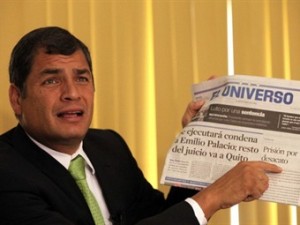Yo Soy Bonil: Suppression of Free Speech in Ecuador
In December 2013, the Ecuadorian government fined El Universo over $90,000 on charges of defamation for publishing a cartoon by Xavier Bonilla (alias, Bonil) about a raid on a journalist’s home, subsequently forcing Bonilla to publish a “correction.” This brazen suppression of freedom of press is not an isolated incident in Ecuador. Rather, it is an example of the increasing censorship faced in Ecuador following the re-election of President Rafael Correa to his third term. President Correa has been a vocal opponent of the media since his first term. During a speech in Costa Rica, Correa declared, “The media is the greatest enemy.” Throughout his presidencies, Correa has often employed criminal defamation laws to silence opinions or facts he disagrees with. One well-known example of this tactic is when in 2011 he sued El Universo in response to an opinion article, which claimed that he had ordered
military forces to fire on civilians during a demonstration by striking police officers. In 2012, Correa used his line-item veto power to prevent media organizations from promoting a candidate during elections.
Correa’s violations of free speech climaxed with a sweeping new Communications Law passed in June 2013. The law allows the government to arbitrarily prosecute and censors the media by permitting the government to deem what information is truthful. Additionally, the law created a government regulatory body, the Superintendent of Information and Communication, whose responsibility is to order media outlet directors to fix and publicly apologize for “untruthful” information, to impose fines for repeated incidents, and to pursue judicial action against such incidents. Bonilla and El Universo were the first parties to be charged by this new governing body.
El Universo agreed to pay the fine for publishing Bonilla’s cartoon; however, Bonilla was not so fast to acquiesce to the government. Instead, Bonilla created a sarcastic cartoon poking fun at the government’s supposed infallibility. In consequence, Bonilla is now facing another case from the government, and is refusing to back down. Bonilla’s actions have earned him praise as “one of South America’s most fearless cartoonists” according to the Index on Censorship, which nominated Bonilla for the 2015 Free Expression Awards this past week.
According to the World Press Freedom Index, between 2013 and 2014, Ecuador went from having the 71st freest press to the 95th freest press. This jump reflects the passage of the Communications Law. Should Ecuador continue on this trajectory it will soon rank alongside Venezuela in terms of suppression of free media. Ultimately, the results of Bonilla’s second trial may prove to be a tipping point for Ecuadorian free speech regardless of the result. If Bonilla wins the trial, the government will have acknowledged to a greater extent the right to free press. If Bonilla loses the trial, it may result in popular upheaval and unrest prompting the government to make concessions leading to greater free media. Regardless, until President Correa’s systematic violations of free speech end, Ecuador is merely a democracy in name.

